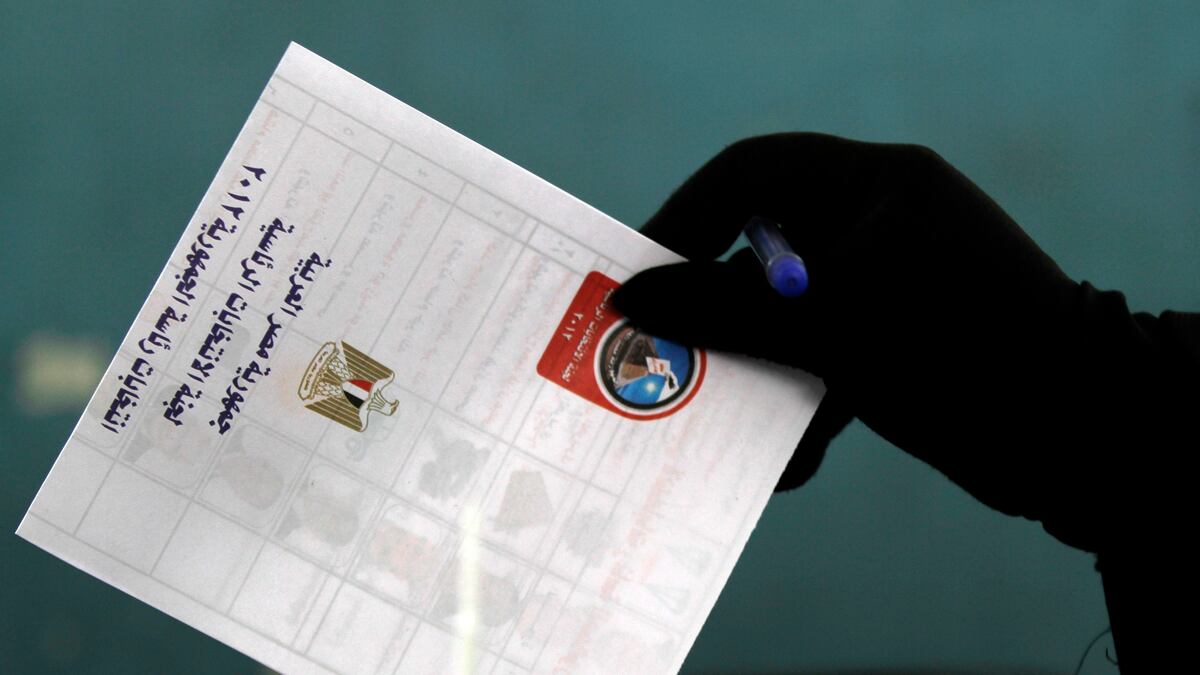When the results of Egypt’s first post-revolution presidential election are released, pundits and analysts will rush to explain why they had to be so. If Muhammad Mursi, the candidate of the Muslim Brotherhood wins, we will be told that it is because Egyptians are desirous of more Islam in their political life. If Ahmed Shafiq (Mubarak’s friend and last prime minister) or Amre Moussa (his former foreign minister) wins, it will be because the people are tired and want a return of Egypt’s sleepy, pre-revolutionary normalcy. If victory goes to Hamdin Sabahi (the leader of a small, well-regarded Arab nationalist party) or Abdel Moneim Aboul Fotouh (a kindly physician and Muslim Brotherhood member turned liberal) it will be because people want an exit from the grim Islamism-or-Mubarak dichotomy of the past.
Readers should take all of these explanations with a grain of salt. Not because any one of them is not true, but because all of them are true, often within the mind of the same Egyptian voter. Whatever the special alchemy that causes a voter to tip one way or the other, it appears only to kick in on the way to the polling station, or once the curtain is drawn. Those of us who have tried to know the mind of the Egyptian electorate have been roundly thwarted, as polls and surveys conducted over the last few weeks have shown crazy swings in public opinion. Sometimes the Muslim Brotherhood is up, other times the old Mubarak cronies are. Many Egyptians have come to the conclusion that poll results are cooked up by partisan media outlets and think tanks to plump for their favorite candidates. This is almost certainly true in some cases. For example, Tawfik Okasha, Egypt’s less coherent version of Glenn Beck, yesterday tweeted an exit poll that gave Shafiq 56 percent of the vote, Moussa 43 percent, and Mursi 34 percent, for a total of 133 percent. But, such farces aside, the volatility of Egyptian polling is for the most part a reflection of volatility in the Egyptian electorate. The people appear not to have made up their minds.
At one level, this uncertainty is to be expected—the candidates have only had a month to campaign, and most voters’ understanding of them is hazy at best. There has been only one presidential debate—a grueling three-hour affair in which only two candidates participated and which was aired on a private satellite TV station whose penetration in Egyptian households is unknown. Voters have simply not had the opportunity to see the candidates and their views pitted against each other.
At the same time, the smart money has long been on the Muslim Brotherhood. After all, the country handed Islamists 70 percent of the seats in its Parliament not six months ago. One can be forgiven for thinking that it would be unlikely then to turn around and elect a non-Islamist to the presidency. For this reason, many expect a runoff between Mursi (the Muslim Brother) and Aboul Fotouh (the former Muslim Brother).
But this is by no means assured. The Brotherhood has lost some of its luster in recent months. Its parliamentarians (admittedly, unfairly) have come under attack for not magically solving Egypt’s problems in their five months in office. The defection of Aboul Fotouh has generated a split within the movement, with many younger brothers torn between loyalty to party and their affection for the genial physician and activist, whose campaign for change has managed to attract an almost impossibly broad tent of liberals and religious conservatives. And finally, the Brotherhood’s decision to field Mursi for president (after having earlier declared that it would not seek a share of executive power) has caused many to doubt the movement’s storied reputation for honesty.

For these reasons, the Brothers are understandably nervous. Egypt’s liberals and non-Islamists, on the other hand, display the calm that comes with having nothing to lose. After the liberals’ stunning defeat in last winter’s parliamentary elections, many Egyptians and observers had counted them out, concluding that the average voter would always respond to religion’s siren call. Anything other than a majority for Islamists in the first round thus has the potential to breathe new life into Egypt’s secular, or non-Islamist, politics.
We’ll know the winner of Egypt’s election in a matter of days. It will take far longer than that to know the true result of the election—that is, whether Egypt’s first popularly elected president will be able to resurrect its economy, pacify its increasingly restive population, return its Army to the barracks, and tame its feral security services. In the face of this uncertainty—about who will win and about what he’ll be able to do once in office—most of us who write about Egypt have been reduced to platitudinous celebrations of Egypt’s first free presidential contest, lamentations of the hard road that Egypt’s future president has before him, and shopworn declarations of how Egyptian politics has changed utterly. Sometimes, the best we can do is just watch.






